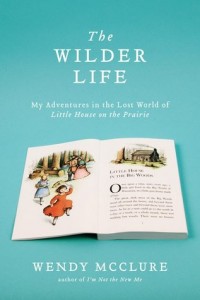The Wilder Life: My Adventures in the Lost World
of Little House on the Prairie
By Wendy McClure
As a child, Wendy McClure loved the Little House books, reading them time and time again. She lost herself in Laura’s world and daydreamed about showing Laura around her own childhood world of McDonald’s and shopping malls. In The Wilder Life, McClure explores the world of Laura Ingalls Wilder and The Little House on the Prairie books. She rereads the books and most literature on Wilder and the Little House books, separating fact from fiction. She churns butter and makes prairie bread, to experience a little bit of Laura first hand. She travels around the mid-West to see where real life and literary Laura and her family lived and to experience a little bit of prairie life herself.
Impressions: When this book was chosen for book club, I was looking forward to reading it. I remember enjoying the Little House on the Prairie books, although I definitely couldn’t remember much about any of the plots or the characters. Regardless, The Wilder Life sounded like it would be interesting, and I thought a lot of memories would come back as I read about McClure’s journey into the stories and the life of Laura Ingalls Wilder.
Not true. After two chapters, I stopped reading, promptly went to the library, and borrowed The Little House on the Prairie. While McClure’s passion for the books was clear, I had a hard time becoming engaged in her story and caught up in her passion since my memory of the books was so vague. Reading the one book definitely helped, but not enough to make The Wilder Life something special.
I found The Wilder Life too disorganized and far too train of thought to enjoy. McClure references several books throughout each chapter, making it feel like there was very little continuity. She has a tendency to jump from her present day journeys into Laura World into literary discussions of the books, commentaries on social themes present in the books (none of which she goes into in any depth), and Laura’s real life. And then she jumps back to the present again. Everything felt so random that it was really hard to enjoy.
In addition, I could see McClure’s attempt at humor be offensive to some people, particularly her comments about people she met on her travels. It didn’t bother me much, but then again, I wasn’t one of the people in the story (the End of Timers, the people who found faith and religion in the Little House books, etc.)
Now don’t get me wrong, there were interesting nuggets about Wilder’s life and her writing of the Little House books. As I was reading, I kept trying to figure out what would make the book more successful but still an autobiography (and not biography or a literary criticism) as it was intended. One thing that might have helped was if McClure delved into Wilder’s life and books in a far more orderly manner – book by book, chronological order of Laura’s life. That might have messed with the chronology of her travels, but would have helped readers who hadn’t just finished the book series. It would also have been helpful if there was an insert with some photos. McClure describes the towns she visited (i.e. Walnut Grove, Minnesota, one of Laura’s childhood homes), little museums, paintings of Laura and the Ingalls family, etc. Perhaps a photo to two for the reader to reference might be helpful in engaging the reader.
Recommendation: If you’re a big Laura Ingalls Wilder and Little House fan and have a strong recollection of the books, this book may be worth reading. If you remember enjoying the series as a child, I’d skip this book unless you reread the series before The Wilder Life.
Grade: C-
